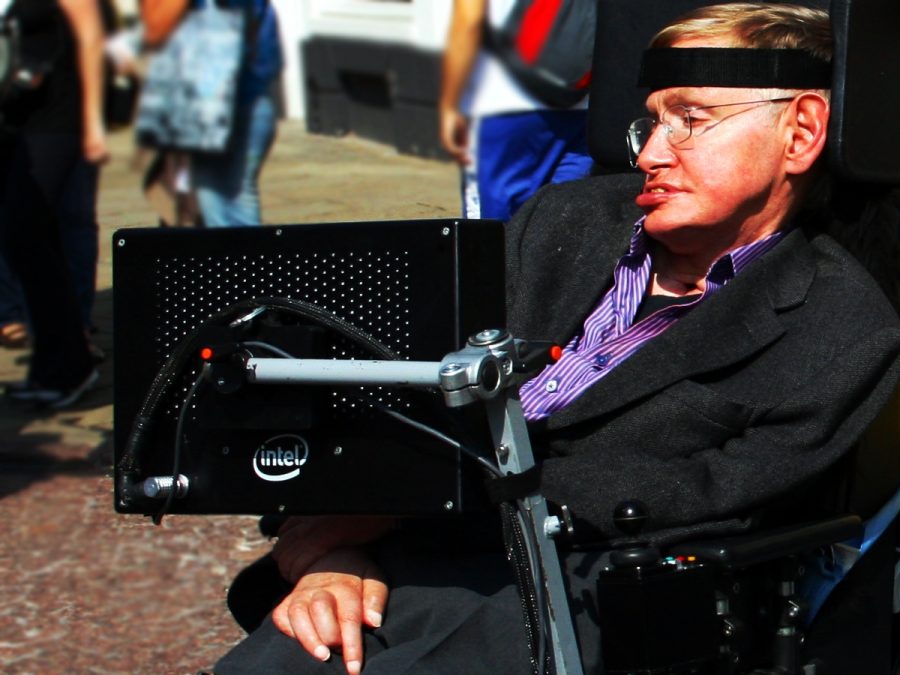Remember Stephen Hawking: Hawking leaves legacy of theoretical physics research and groundbreaking discoveries
Courtesy of Wikimedia Commons
Hawking gives a lecture for NASA’s 50th anniversary in 2008. He died on Mar. 14 at age 76 in his home in Cambridge, England.
April 23, 2018
Renowned theoretical physicist and author Stephen Hawking died at age 76 on March 14 after a long battle with Amyotrophic Lateral Sclerosis (ALS).
Members of Hawking’s family released a statement shortly after his death saying he died at his home in Cambridge, England.
As the Director of Research at the Center for Theoretical Cosmology at the University of Cambridge, his breakthrough research covers gravitational singularity theorems in relation to general relativity and the prediction of “Hawking radiation,” the notion of radiation emitted from black holes.
“I learned about Stephen Hawking during my primary school years in Beijing. We had a Chinese textbook and one of the passages was about Stephen Hawking.” Emma Li (10) said, “a description [in the text] that really made an impact on me was that it took eight hours for him to type his speech, but still he ended up being one of the most influential person. I was particularly fascinated by his research on the black hole.”
Recognized as one of the most influential scientists in the modern era, his research has revolutionized the way physicists and scientists view black holes and elements of the universe. Accordingly, Hawking was an honorary fellow of the Royal Society of Arts, member of the Pontifical Academy of Sciences and a recipient of the Presidential Medal of Freedom, among other achievements.
Hawking published his work in 1988 in his best-selling book “A Brief History of Time,” which made his work accessible to individuals who no prior background in physics.
Hawking is a role model for chemistry teacher Dr. Smriti Koodenjari. She is an avid enthusiast of physics and encountered Hawking a several years ago in a conference.
“I was a teenager, and my dad. . . brought home a book, “A Brief History of Time”. In the beginning I was a little confused with the physics, but I persisted, and it was almost like, ‘Wow!’. I had this feeling,” she said. “I was so stunned and surprised [about the twin theory]. I ran into the kitchen and my mom was cutting vegetables. I said, ‘Did you know?’—talking about the twin theory. She didn’t get it and didn’t care and kept cutting her vegetables.”
In 2014, film The Theory of Everything featured the life and relationship of Hawking and former wife, Jane Hawking, exploring family and health problems.
Hawking began experiencing symptoms of ALS, a rare early onset motor neurone disease, at age 21, when doctors predicted only two more years to live. Fortunately, Hawking survived for much longer though he developed near-total paralysis, impaired motor functions and limited speech ability.
“The resilience he has. He could easily given up [because of his disease]. He could’ve told himself that ‘I’m going to die’ and ‘I’m going to be completely paralyzed’. But he’s always been grateful. He’s always had a sense of humour. In talk shows, he’s pretty sarcastic and funny. What I admire about him is his having the will to live and living a good life, in spite of not being able to move. I think he laughs at his disability.” Dr. Koodenjari said.
This piece was originally published in the pages of the Winged Post on March 29, 2018.




![LALC Vice President of External Affairs Raeanne Li (11) explains the International Phonetic Alphabet to attendees. "We decided to have more fun topics this year instead of just talking about the same things every year so our older members can also [enjoy],” Raeanne said.](https://harkeraquila.com/wp-content/uploads/2025/10/DSC_4627-1200x795.jpg)


















![“[Building nerf blasters] became this outlet of creativity for me that hasn't been matched by anything else. The process [of] making a build complete to your desire is such a painstakingly difficult process, but I've had to learn from [the skills needed from] soldering to proper painting. There's so many different options for everything, if you think about it, it exists. The best part is [that] if it doesn't exist, you can build it yourself," Ishaan Parate said.](https://harkeraquila.com/wp-content/uploads/2022/08/DSC_8149-900x604.jpg)




![“When I came into high school, I was ready to be a follower. But DECA was a game changer for me. It helped me overcome my fear of public speaking, and it's played such a major role in who I've become today. To be able to successfully lead a chapter of 150 students, an officer team and be one of the upperclassmen I once really admired is something I'm [really] proud of,” Anvitha Tummala ('21) said.](https://harkeraquila.com/wp-content/uploads/2021/07/Screen-Shot-2021-07-25-at-9.50.05-AM-900x594.png)







![“I think getting up in the morning and having a sense of purpose [is exciting]. I think without a certain amount of drive, life is kind of obsolete and mundane, and I think having that every single day is what makes each day unique and kind of makes life exciting,” Neymika Jain (12) said.](https://harkeraquila.com/wp-content/uploads/2017/06/Screen-Shot-2017-06-03-at-4.54.16-PM.png)








![“My slogan is ‘slow feet, don’t eat, and I’m hungry.’ You need to run fast to get where you are–you aren't going to get those championships if you aren't fast,” Angel Cervantes (12) said. “I want to do well in school on my tests and in track and win championships for my team. I live by that, [and] I can do that anywhere: in the classroom or on the field.”](https://harkeraquila.com/wp-content/uploads/2018/06/DSC5146-900x601.jpg)
![“[Volleyball has] taught me how to fall correctly, and another thing it taught is that you don’t have to be the best at something to be good at it. If you just hit the ball in a smart way, then it still scores points and you’re good at it. You could be a background player and still make a much bigger impact on the team than you would think,” Anya Gert (’20) said.](https://harkeraquila.com/wp-content/uploads/2020/06/AnnaGert_JinTuan_HoHPhotoEdited-600x900.jpeg)

![“I'm not nearly there yet, but [my confidence has] definitely been getting better since I was pretty shy and timid coming into Harker my freshman year. I know that there's a lot of people that are really confident in what they do, and I really admire them. Everyone's so driven and that has really pushed me to kind of try to find my own place in high school and be more confident,” Alyssa Huang (’20) said.](https://harkeraquila.com/wp-content/uploads/2020/06/AlyssaHuang_EmilyChen_HoHPhoto-900x749.jpeg)











